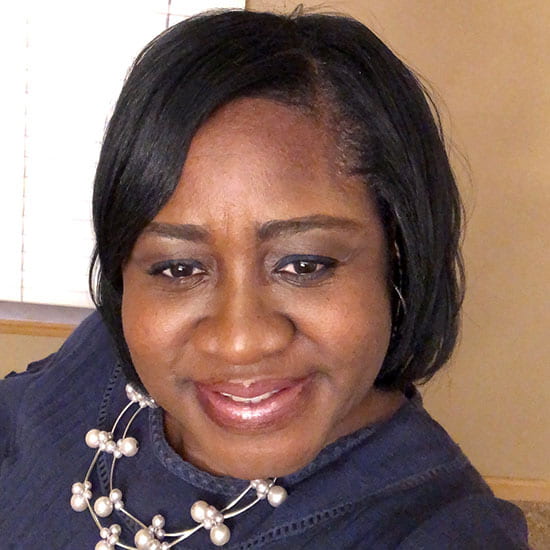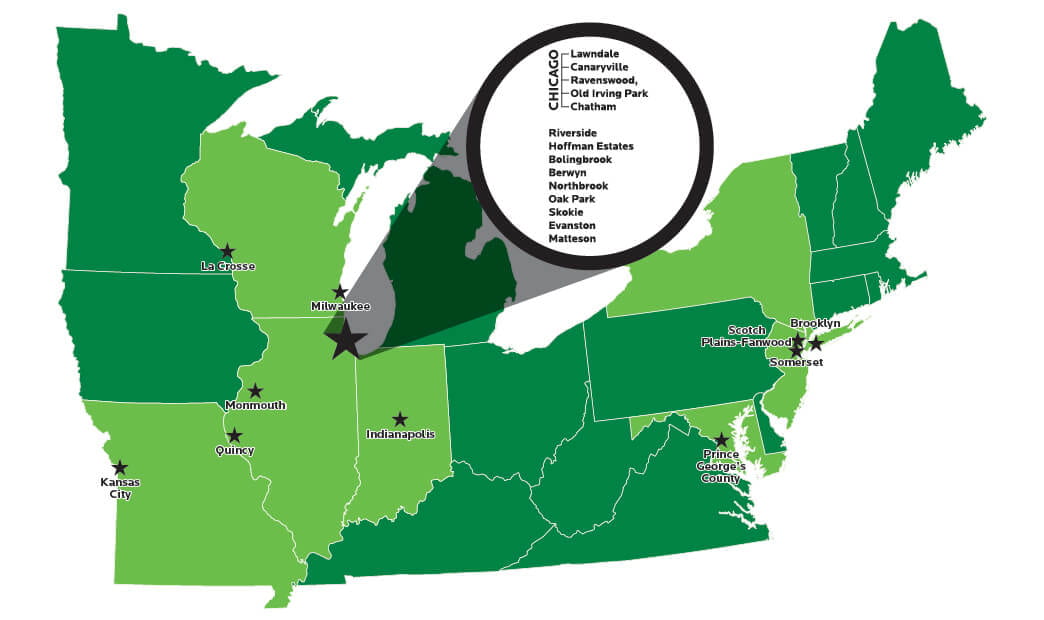Teaching Music Teachers
Arts & CultureMusic educators form powerful bonds with their students in ways few others do. Over the years, Roosevelt graduates have touched the lives of music students across the state and country.
In winter 2016, a student choir from Gary, Indiana traveled to the White House to perform for Barack and Michelle Obama. The 25 students, singing Christmas songs and “America the Beautiful,” were the only high schoolers invited to perform at the reception.

Kammille Brinker (BM ’94) directed middle school choir for 22 years at the Wirt-Emerson Academy of Visual and Performing Arts. Her students had performed for incredible audiences over the years, like Michael Jackson’s family, and Brinker herself has sung for many events.
But this performance stands out. “It was so meaningful — not just for us, but for those kids,” she said.
Music educators form powerful bonds with their students in ways few others do. Cheryl Frazes Hill taught high school students for 13 years before coming to the Chicago College of Performing Arts (CCPA). She still remembers one parent asking her to convince their son, one of her high school students, to get a haircut — he wouldn’t listen to them, but maybe he would listen to her.
Over the years, Roosevelt graduates have touched the lives of music students across the state and country.
“The influence that our students will have over their future students is very special,” Frazes Hill said. “When a Roosevelt graduate starts teaching, they now reach a whole new generation of students who are going to be exposed to music education.”
Finding a job teaching music teachers
On graduation day, James Baum (BM ’07) crossed the Auditorium Theatre stage in the morning and interviewed for his dream job in the afternoon. Baum teaches music and directs the band program at his alma mater, Riverside Brookfield High School.
He remembers classroom visits early in his CCPA education, when his professors brought him to an elementary school on the North Side. Roosevelt has close partnerships in Chicago Public Schools, which introduces music education students to the city’s diverse music classrooms. Students get authentic experiences in these classrooms before they start student teaching.
“Teacher preparation gets you ready to make that leap to be in charge of a classroom,” said Baum. “But once you get there, you have to be ready to keep growing because it’s a constantly evolving field.”
Music education students compile digital portfolios throughout their four years, collecting their best work as musicians and as educators-in-training for this digital resume. The project also helps prepare students for the professional writing that will be expected of them during their formal teacher evaluations.
Professor Dan Healy serves as the program head for music education at Roosevelt University.
“I’m thrilled by the caliber of students who are graduating from our program and entering the teaching profession,” he said. “Time and time again, these students and alumni have proven themselves to be both dynamic music educators and empathetic mentors for young people with an eye to Roosevelt University’s social justice mission.”
Where Do Roosevelt Graduates Teach?
With a 98% job placement rate six months after graduation, music education alumni teach in schools across the country. Here are just a few.

Mastering (or shattering) the fundamentals
At Wirt-Emerson, Brinker taught talented students that went on to win full-ride scholarships or joined the Fisk Jubilee Singers. “My middle school choir was like a high school choir,” she said. “We taught them commitment, and it just kept going.”
Their skill came from their fundamentals, sharpened by Brinker’s teaching. Brinker believes that you can learn how to dictate your class through experience, but the fundamental skills can make you or break you as a music teacher.
She remembers learning dictation from Dr. Rudy Marcozzi, now dean of the CCPA. “I struggled in the beginning and had to retake it,” she recalls. But once she mastered her skills, she could teach music theory and written and oral dictation to her fifth graders.
Today Brinker directs the middle school choir at the Michelle Obama School of Technology and the Arts. Brinker has brought new rigor to the program, and has been able to direct her students through the pandemic because of their strong grasp on theory.
The CCPA also prepares students to reinvent common practice.
“The music education faculty are pushing forward with our mission of developing more practitioner experience, while preparing our graduates for the changing education landscape,” said Healy. In the next few years, the CCPA hopes to develop a licensure certification program for performance majors and a dual degree in music education and songwriting/music production.
Brinker is now writing a book to help music teachers teach spirituals. Monica Huntz (BM ’13) helped design a band program where all 360 students at the school learned an instrument. During Baum’s tenure, his school started a rock band class, now 30 students strong.
Baum also started an innovative policy where he asks kids to grade themselves. The goal, Baum says, is “getting kids to take charge of their own education, because ultimately, that’s the only way we learn.”
Building a life in music
Some Roosevelt students always knew they wanted to become music teachers. For others, the program is a process of discovery.
The dual major track in music education and performance gives students the chance to explore both sides of their identity. Students can visualize a life in music with their professors as role models — many combine their education careers with performances at major Chicago institutions. Frazes Hill is the associate conductor of the Chicago Symphony Chorus and conductor of the Milwaukee Symphony Chorus.
Alumni also continue to perform while teaching full-time. Alice Beals (BM ’17) teaches music and sings with the professional Glassbrook Vocal Ensemble. Ausberto Acevedo (BM ’12) directs a high school orchestra and performs with a folk group gaining critical acclaim.
Their talent for performance helps students grow into themselves as educators. “The better you are as a player and singer, the better you are as a teacher. And the better you are as a teacher, the better you play and sing,” she said. “Those things are connected.”
Frazes Hill has served as an associate professor of music education and director of choral activities at Roosevelt since 2002. She continues to work with many former students in Roosevelt’s Alumni Choir. Participants majored in applied voice, music education or even instrumental music. All are eager to come back together to sing.
The alumni choir often performs at Orchestra Hall with the Chicago Sinfonietta, and made three appearances in concert with the Rolling Stones. For many, it’s an opportunity to stay connected to the music they love while teaching.
Music and social justice
Many students strongly connect to Roosevelt’s social justice mission through their music education studies.
 We’re teaching a bigger picture: how to be a human being and through music, how greater understanding and social justice can be achieved.
We’re teaching a bigger picture: how to be a human being and through music, how greater understanding and social justice can be achieved.
– Dr. Cheryl Frazes Hill
Undergraduates learn the parts of the job that go beyond the classroom: writing grants and engaging support from the school system to get the materials you need. Kiera Radvanski (BM ’15) and her colleagues recently rebuilt their music program to make it more equitable for their middle school students. “Our University’s mission of social justice helped to prepare me to be an advocate for my students and their families,” she said.
Baum says he hopes above all to make music accessible to everyone. “Finding ways to reach every kid is a struggle, but it’s also it’s really rewarding once you do,” he said.
Performing together during a pandemic
Music educators are used to working with students in person, but the distance learning has required that educators get creative. Alumni create impressive performances by stitching together video, many becoming school leaders in learning technology.
During hybrid learning, Baum paired students in the building with another at home to share feedback and meet new people.
“When you’re making music with someone, you should be friends,” said Baum. “Hopefully I’m laying some groundwork for next year, when we can get back to good music-making in person.”
